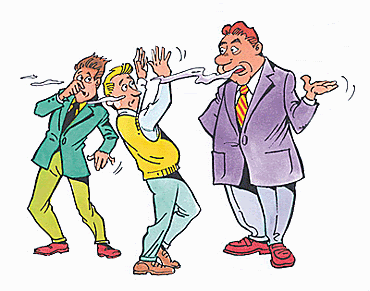Dental Health and Bad Breath
Cure Your Bad Breath In 3 Days, Click Here To Know More
>> Click Here To Know The Symptoms, Causes & Effective Cures For Bad Breath <<
Poor dental hygiene and periodontal disease can be a source of bad breath. If you don?t brush and floss daily, food particles remain in your mouth, collecting bacteria and emitting hydrogen sulfur vapors. A colorless, sticky film of bacteria (plaque) forms on your teeth.
If not brushed away, plaque can irritate your gums (gingivitis) and cause tooth decay, Eventually, plaque-filled pockets can form between your teeth and gums (periodontitis), worsening this problem and your breath. Dentures that aren?t cleaned regularly or do not fit properly also can harbor odor-causing bacteria and food particles.
If you do not brush and floss daily, particles of food remain in the mouth, collecting bacteria, which can cause bad breath. Food that collects between the teeth, on the tongue and around the gums can rot, leaving an unpleasant odor. Dentures that are not cleaned properly can also harbor odor-causing bacteria and food particles.
One of the warning signs of periodontal (gum) disease is persistent bad breath or a bad taste in the mouth. Periodontal disease is caused by plaque, the sticky, colorless film of bacteria that constantly forms on teeth. The bacteria create toxins that irritate the gums. In the advanced stage of the disease, the gums, bone and other structures that support the teeth become damaged. With regular dental checkups, your dentist can detect and treat periodontal disease early.
Bad breath is also caused by dry mouth (xerostomia), which occurs when the flow of saliva decreases. Saliva is necessary to cleanse the mouth and remove particles that may cause odor. Dry mouth may be caused by various medications, salivary gland problems or continuously breathing through the mouth. If you suffer from dry mouth, your dentist may prescribe an artificial saliva, or suggest you using sugarless candy and increasing your fluid intake.
Eliminating periodontal disease and maintaining good oral health is essential to reducing bad breath. Schedule regular dental visits for a professional cleaning and checkup. If you think you have constant bad breath, keep a log of the foods you eat and make a list of medications you take. Some medications may play a role in creating mouth odors. Let your dentist know if you?ve had any surgery or illness since your last appointment.
Brush twice a day with a fluoride toothpaste to remove food debris and plaque. Brush your tongue, too. Once a day, use floss or an interdental cleaner to clean between teeth. If you wear removal dentures take them at night. Clean them thoroughly before replacing them the next morning.
Mouthwashes are generally cosmetic and do not have a long-lasting effect on bad breath. If you must constantly use a breath freshener to hide unpleasant mouth odor, see your dentist, If you need extra help in controlling plaque, your dentist may recommend using a special antimicrobial mouth rinse. A fluoride mouth rinse, used along with brushing and flossing, can prevent tooth decay.
Regular checkups will allow your dentist to detect any problems such as periodontal disease, a dry mouth or other disorders that may be the cause. Maintaining good oral hygiene, eliminating periodontal disease and scheduling regular professional cleanings are essential to reducing bad breath.
Jim Martinez is a National Sales Director for Ameriplan USA, offering discount dental, prescription, health, vision and chiropractic plans. Get information on Ameriplan discount dental plans and more health related articles.
Labels: acid_bad_breath_reflux, adult_bad_breath, angeles_bad_breath_in_los, b.h_bad_breath_in, bad_beverly_breath_hills, bad_breath_cause_cure

